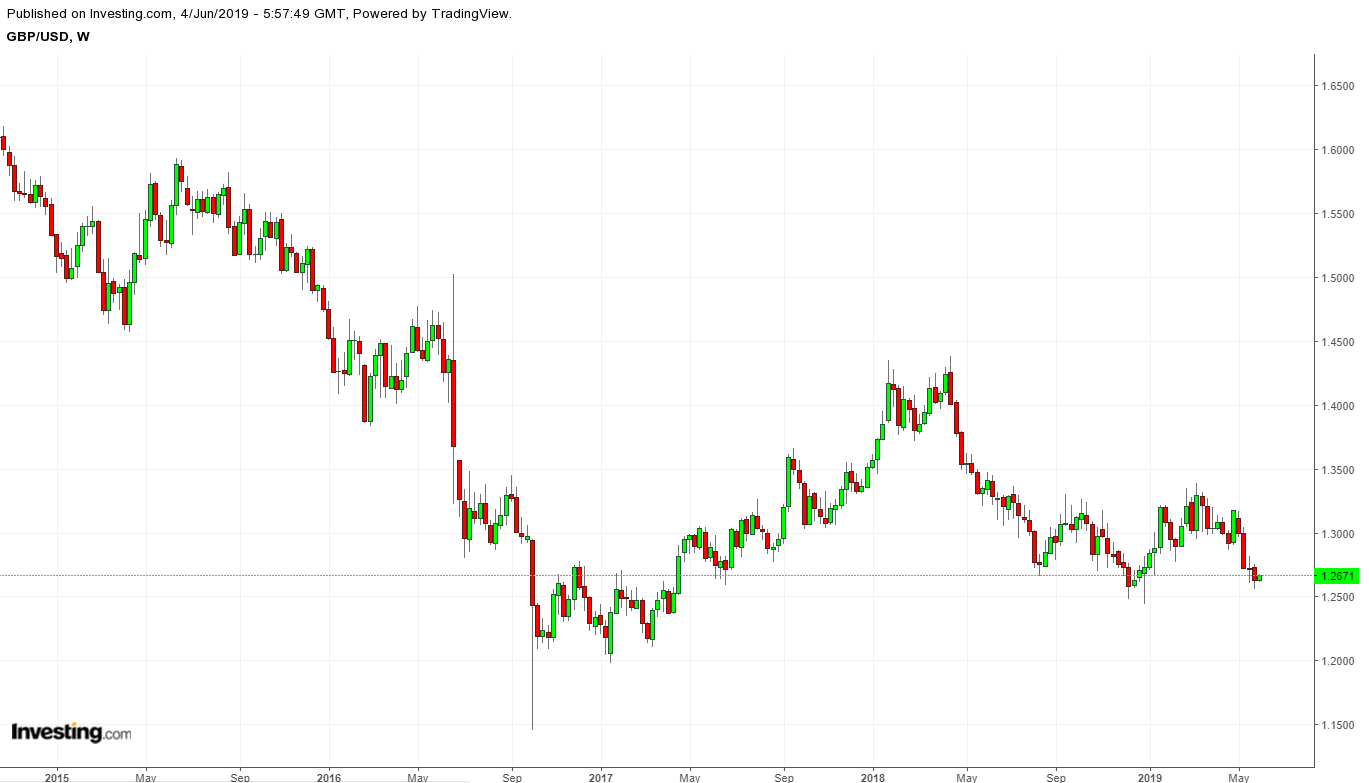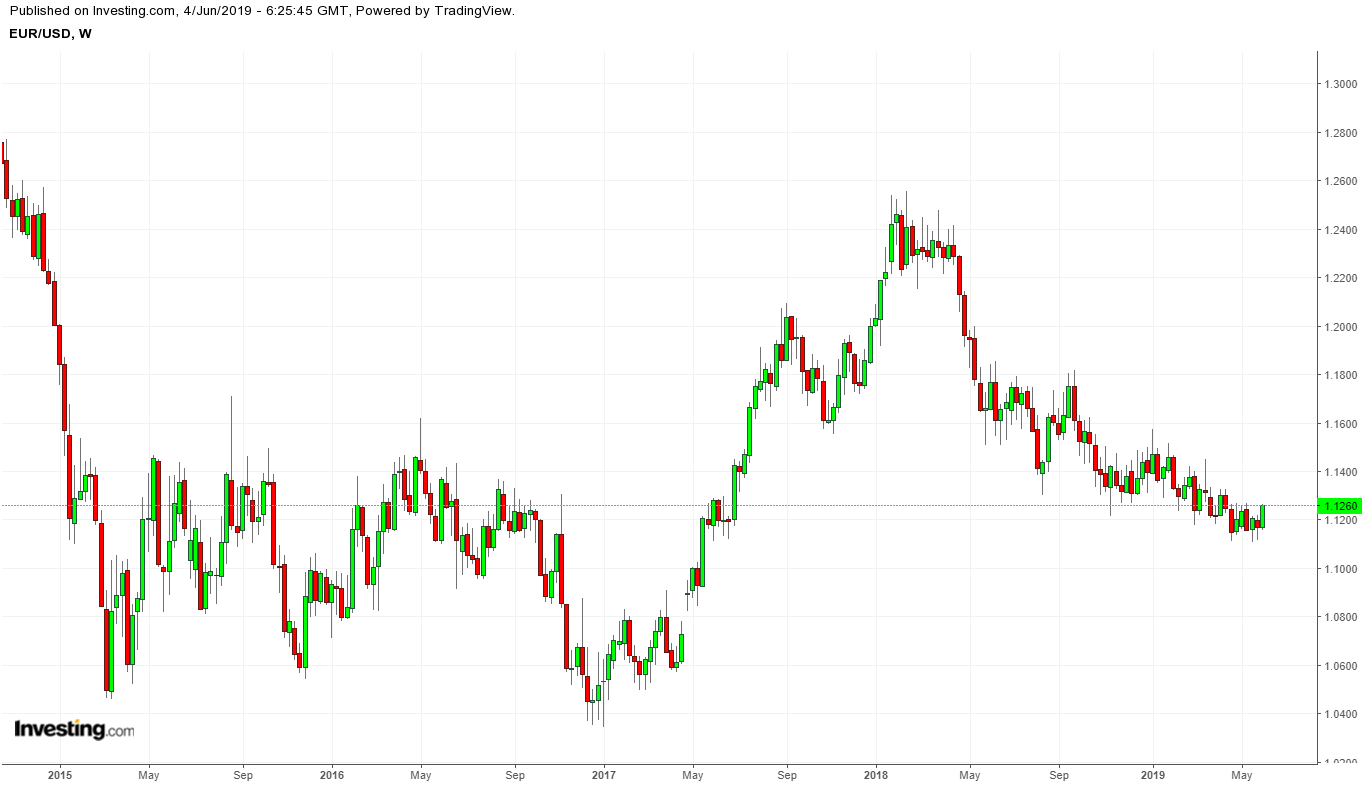The pound sterling held its own as the March 29 deadline for Brexit approached and FX traders maintained hope that reason would prevail and a long transition period would ease the U.K.'s exit from the European Union. Even when the deadline was extended two weeks to April 12, traders kept their nerve.
But the subsequent extension to October 31 was a bridge too far. Sterling has been spiraling lower as the chances for a deal fade. Perhaps more significantly, six months appears to be a longer time horizon than traders were willing to accept. The pound is now hovering around 1.26 against the dollar, compared to 1.32 in March and 1.30 into April.

The euro, too, was relatively steady as markets waited for the European Parliament elections, in order to get a reading on where the EU was going with a complete reshuffle of its leadership. The feared rightward lurch didn't materialize but the mainstream center-right and center-left blocs failed to get the majority that had allowed them to call the shots.
This threw the horse-trading over who would get the all-important presidency of the European Commission into doubt and postponed any clarity about the leadership positions, including the new president of the European Central Bank and the European Council.

The single currency has now slumped below 1.13 to the dollar, compared to its 12-month high of 1.18.
In short, widespread political paralysis has created a situation where investors must wait for answers to fundamental questions about where two of the world’s main currencies, the pound and the euro, will be going. It is a political limbo that makes currency trading more challenging than usual.
Meanwhile, President Donald Trump brandished new tariff threats—against China, against the European Union and, most recently, against Mexico. Perversely, this uncertainty has rebounded in favor of the dollar, as investors piled into Treasuries as a safe haven, not even bothering to hedge their investment, and boosted the U.S. currency. The Dollar Index Futures is now comfortably above 97, compared to a low around 93 last fall.
This week, Trump is taking his bull-in-a-china-shop show to the U.K., touting hardcore Brexiteers Boris Johnson and Nigel Farage as his favorite Brits and making no bones about the fact that he thinks a no-deal Brexit could be a good thing. And indeed, it's looking more and more like Boris Johnson’s moment has come as he pulls the Conservative Party towards a harder stance on leaving by the October deadline, deal or no deal.
The party membership leans euro-skeptic and will have the final word. But their vote will not happen until the second half of July, several long weeks for a currency market that will start pricing a no-deal Brexit into the pound.
The European Union is certainly in no position to back down on its stance that it will make no further substantive changes in the deal concluded by outgoing Prime Minister Theresa May. German Chancellor Angela Merkel has pretty much had her way in dictating EU policy and personnel, but the poor showing of Germany’s mainstream parties in the European elections has not only weakened her preferred candidate for commission president, Manfred Weber from the Bavarian wing of the Christian Democrats, but has thrown the Social Democratic Party and her grand coalition government into complete disarray.
French President Emmanuel Macron is fighting enshrinement of the spitzenkandidat model for choosing the commission president, arguing that the treaties give this decision to the national leaders. The German word refers to the designation of a candidate in each of the European political parties as an EU-wide standard-bearer, with the spitzenkandidat of the group collecting the most votes automatically obtaining the commission presidency.
The first and perhaps only time this model was used was in the 2014 European elections when Jean-Claude Juncker led the European People’s Party to victory and installed himself as the EU’s top executive. Macron argues this method never had much credibility, even less so given the EPP’s weak performance in this year’s election, even though it was once again the top vote-getter.
Denmark’s Margrethe Vestager, the current EU commissioner for competition, famous for levying heavy fines against Apple (NASDAQ:AAPL) and Google (NASDAQ:GOOGL), is making a strong play for the top commission post. She belongs to the same Alliance of Liberals and Democrats (ALDE) as Macron’s Republique en Marche party and may get his backing to become the first woman president of the commission. ALDE did not name a single spitzenkandidat in the election, but a team of seven, including Vestager.
If Vestager or someone else does elbow Manfred Weber, Merkel's choice for EU head, aside, it would free the way for German central bank president Jens Weidmann to succeed Italy’s Mario Draghi as president of the European Central Bank—an outcome fraught with consequences for European monetary policy. Weidmann has opposed many of Draghi’s dovish policies, from low interest rates to the ECB’s asset purchase program.
The road to the ECB presidency seemed closed to Weidmann as long as Weber was headed for the commission presidency. If Weber doesn’t get that job, it will be difficult to deny Germany and Weidmann the ECB post. His ascendancy would change the picture for currency traders, though in which direction would depend on their view of how the German’s relative inflexibility would impact eurozone monetary policy.
The current European Council president, Donald Tusk, hopes to complete the horse-trading for the top jobs by the end of this month, though that may be optimistic given the frictions. Of course, that would mean more limbo, more hell.
